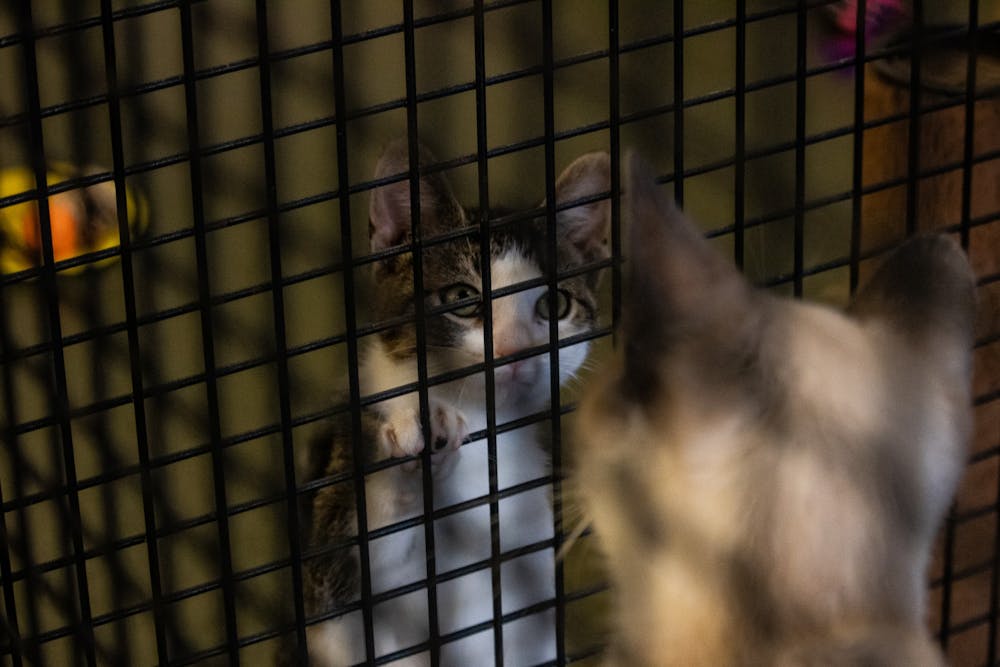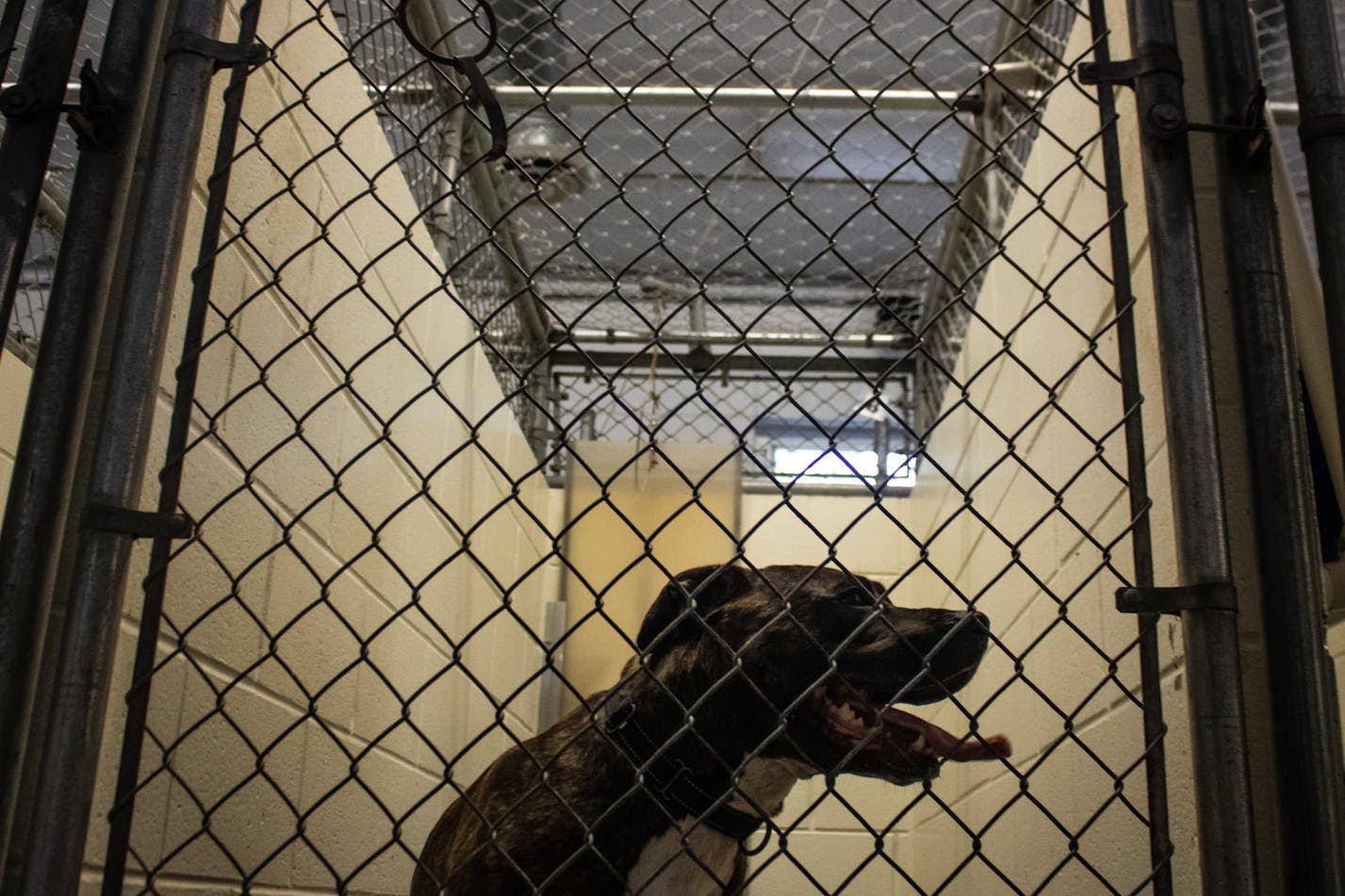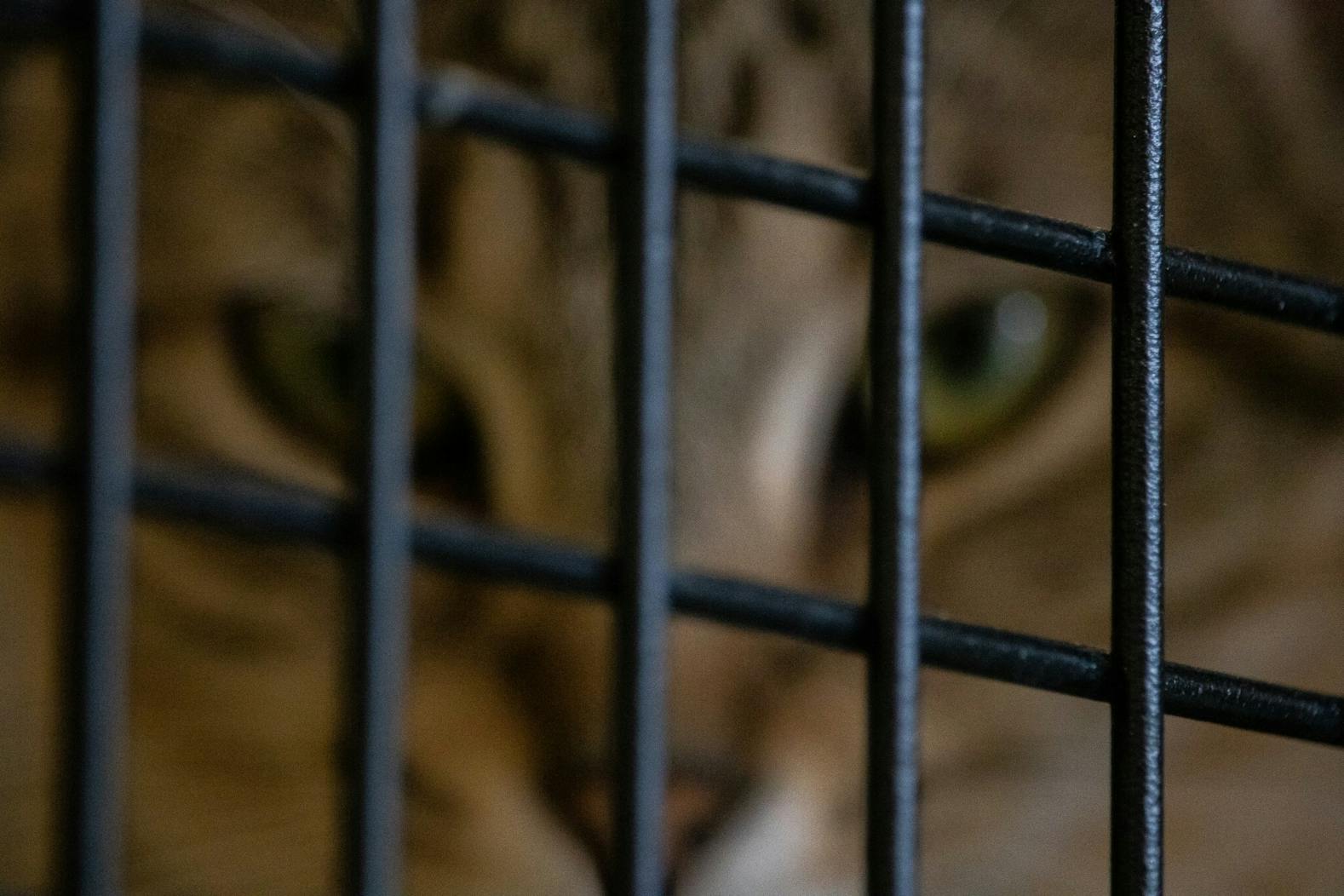Pandemic pets: Animal shelters continue adoptions in wake of financial and medical hurdles

A cat paws at another through its cage, as the other hisses back Aug. 27 at the Humane Animal Treatment Society in Mount Pleasant.
Angela Miedema’s office is located in a hallway behind two large, roomy cages where two kittens were mewling. A kitten with white and brown splotched fur jumped up on top of a house and eyed her an adult cat in another cage.
Her leg was broken, so about a foot of height was all she could manage, Miedema said. The janitorial cart was still sitting in the middle of the entrance, and the smell of cleaning supplies lingered in the air. Two staff members were discussing a dog peeing on the floor some minutes before Miedema arrived.
Both The Washington Post and MLive reported that adoption and foster rates have climbed for animal shelters amid the pandemic. However, shelters have not been spared from negative effects of the coronavirus. Humane Animal Treatment Society went from a staff of 20 people to just five shortly after state orders shut down animal shelters to the public on March 20. They moved operations online to offer virtual adoptions.
“I was very, very nervous,” Miedema said. “If we still have to bring animals in — and we can’t bring them out because they have to be spayed and neutered as ordered by the state — what will we do when we get full?”
Because of shelters like HATS being so full, everybody was sent towards Karma Kat Café, said Katelynn Sikkila, a manager of Karma Kat. The business closed temporarily on March 20 along with HATS.
“When we were closed, it was really difficult to bring in more (cats), so our rescue numbers were kind of at a standstill,” Sikkila said. “Since we’ve reopened though, it has ticked up like crazy. Honestly, I actually have 22 missed calls from 9 p.m. last night, and I guarantee 90 percent of those are somebody wanting me to take in cats. It literally never ends.”
There was a load of pending applications for a pug-chihuahua named Buddy at HATS. Small dogs go quick, Miedema said, and a pitbull could take up to six months to be adopted. Nonetheless, the number of adoptions and intakes are at the same level as last year.

A dog stands in his cage Aug. 27 at the Human Animal Treatment Society in Mount Pleasant.
When donations went down, funding became a chief concern for both HATS and Karma Kat Café. HATS couldn’t hold its annual gala event that brings in around $80,000 a year, which was a massive hit to the shelter, Miedema said.
However, foster families highly increased for the shelter, so puppies and kittens could be taken care of when the shelter couldn’t spare as many resources.
“What we saw immediately was a ton of people stepping up to be fosters,” Miedema said. “We’re really happy to see that people from our community offering their homes.”
Karma Kat, on the other hand, survives on visitation fees to support its operations, Sikkila said. While the café was able to scrape by, it had to stop taking in strays until it reopened on June 10.
Getting medical care for cats has been difficult for both Karma Kat and HATS. Veterinarians were only taking emergency situations.
“Any cats we had that had minor (medical needs) like dental had appointments scheduled weeks out instead of the next day or two,” Sikkila said.
HATS had to close its pet clinic because its surgeons required personal protective equipment that hospitals on the front lines desperately needed. Adopters faced a hurdle as well: unless they were a steady patient, vets would not treat your pet regularly as before. As a result, strays coming in had pneumonia since any previous owner would not have been able to treat what would have been a simple cold, Miedema said.
“Our medical costs with the animals we’ve seen come in have skyrocketed,” Miedema said. “We’re trying to do the best that we can, but we can only do so much, and it requires lots of funding to be able to take care of.”
Alexis Higgins, a Port Huron junior, waited two months to get vaccines for her cat, Lola.
“I was lucky that I got into a (veterinary clinic),” Higgins said.
The wait was worth it for Higgins. Since she was alone in an apartment for the summer, her cat greatly helped her mental health, she said.

A cat sits in his cage Aug. 27 at the Human Animal Treatment Society in Mount Pleasant.
The future for both HATS and Karma Kat are looking stable. The cat café is picking up business again now that Central Michigan University students are back. HATS is seeing more volunteers applying and are learning the value of online marketing. HATS will be focusing more on online fundraising platforms to explain animals’ personalities, Miedema said.
“Since reopening, it’s been pretty great,” Sikkila said. “We’ve done ten adoptions since opening, which is huge.”
Students can help by donating to HATS and giving Karma Kat Café a visit. HATS is also running programs to increase donations, such as a virtual 5K. Participants record how much they've run or walked every day to raise money for the shelter. Anyone interested can visit the HATS website to sign up for $25.






